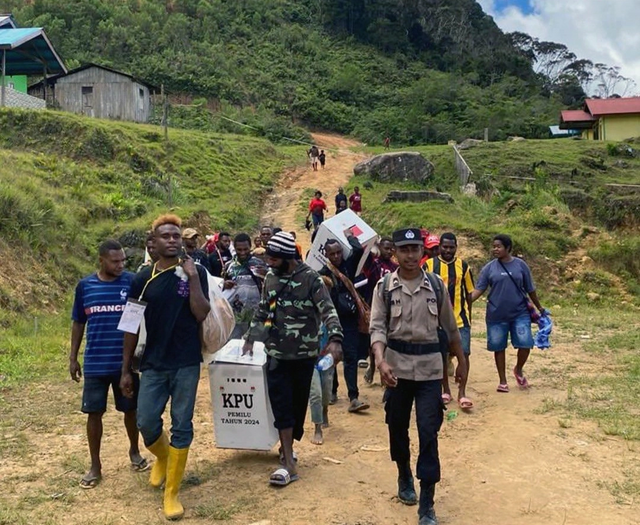On 14 February this year, elections were held in Indonesia, including in the six provinces of the Indonesian half of the island of New Guinea: Papua, West Papua, and the four newly established provinces of Southwest Papua, South Papua, Central Papua, and Highland Papua. Elections were held to elect candidates to the Presidency and Vice Presidency, House of Representatives (Dewan Perwakilan Rakyat, DPR), Regional Representative Council (Dewan Perwakilan Daerah, DPD), six provincial representative councils, and 42 municipal councils. But unlike other regions of Indonesia which use a one person, one vote system, parts of Indonesian Papua use the traditional noken system, in which village chiefs (kepala kampung) cast votes on behalf of the entire village population using traditional noken woven bags.
Twelve municipalities in Indonesian Papua utilised the noken system in the recent elections: six in Central Papua (representing 68% of the province’s total electorate) and, with certain exceptions for some (mainly urban) districts and villages which have transitioned to a one person, one vote system, six in Highland Papua (representing up to 85% of the province’s total electorate). Together, these municipalities elected six House of Representatives members, eight Regional Representative Council members, 60 provincial legislature members in the two provinces, and 315 municipal council members distributed between the 12 municipalities.
Despite several issues with the noken system, chief among them the lack of representation of Papuan women, the Constitutional Court of Indonesia has upheld its use in Papua as a form of indigenous deliberative democracy. This allows for elections to proceed in the region, acknowledging the geographical isolation that impedes the full implementation of the one person, one vote system.
Indonesian electoral regulations mandate that a minimum of 30% of legislative candidates on a party’s ballot (which typically includes between three and 12 candidates) must be women. Moreover, it is stipulated that at least 30% of leadership positions within political parties from the national to district levels must be held by women. These regulations are instituted to encourage women’s participation in electoral politics. However, the outcomes of legislative elections in municipalities employing the noken system reveal a significant disparity in women’s representation compared to other regions of Papua (and Indonesia in general).
All six House of Representatives members elected in the 2024 election through the noken system (three in Central Papua and three in Highland Papua) are men. Likewise, among the eight Regional Representative Council members elected through the noken system, six are men and two are women: Lis Tabuni, an out-of-province politician from Tolikara, Highland Papua, was elected with 246,693 votes, the most in the province, while Eka Kristina Yeimo, an academic from Nabire, was elected to represent Central Papua with 146,004 votes, third-most in the province.
In lower-level elections, the gender disparity is even more apparent. Among the 29 Central Papua Representative Council (DPRPT) members elected through the noken system, all are men, compared with the four women (in addition to 12 men) elected to represent municipalities using a one person, one vote system. Female candidates mostly received zero votes in the recent elections from any village utilising the male-controlled noken system.
One example of this is in Puncak Jaya, Central Papua, where of the 90 candidates for the DPRPT, 29 were women, just below the 30% requirement. However, only five of these candidates received any votes, with the vast majority receiving zero votes. Under the noken system, women candidates were even denied the opportunity to vote for themselves, instead having to entrust their vote to their respective village chiefs (always male), resulting in overwhelming support for male candidates. In the municipal elections, women are also under-represented in municipalities using the noken system (Figure 1) compared to those using a one person, one vote system (Figure 2).


An interesting contrast in women’s representation can be observed between Nabire and Paniai municipalities. Nabire has a significantly higher level of women’s representation in its municipal council compared to Paniai, despite their cultural similarities as neighbouring municipalities. This indicates that the current implementation of the noken system in parts of Indonesian Papua prevents women from being elected to the legislature at all levels.
Initially designed as a pragmatic solution to Papua’s geographical challenges, the noken system is gradually being replaced. As the results in Nabire showed, the phasing out of the noken system will improve women’s representation in legislatures in Central and Highland Papua. Nevertheless, until these reforms are instituted, there is still a pressing need to address the persistent and often total under-representation of women in legislatures in the region. A recent proposal by women politicians in Nduga, Highland Papua, demanded the reservation of six seats in the Nduga municipal council and two in the Highland Papua provincial council (for the Nduga electorate) for women. In 2020, the chairman of the Papuan People’s Assembly (Majelis Rakyat Papua), the customary assembly of the province, endorsed the discontinuation of the noken system, labelling it as discriminatory towards women.
To a significant degree, women bear the brunt of the ongoing conflict in Indonesian Papua. In August 2023, Michelle Kurisi Doga, a Papuan women’s rights activist affiliated with the Gerindra Party, was murdered by suspected separatists in Lanny Jaya, Highland Papua, while a 2017 study of 170 Papuan women found that 40 have experienced state-perpetrated violence, including sexual assault and dispossession. Additionally, women from Papua have the lowest literacy and school participation rates in the country. The political exclusion currently experienced by Papuan women in municipalities using the noken voting method is both a cause and result of this vicious cycle.
Perhaps it is time for Papuan women to step forward and advocate for the abolition of the discriminatory noken system or, at the very least, push for substantial reforms to ensure women’s representation in legislative councils across regions using the noken system. It’s time for a change.



Leave a Comment